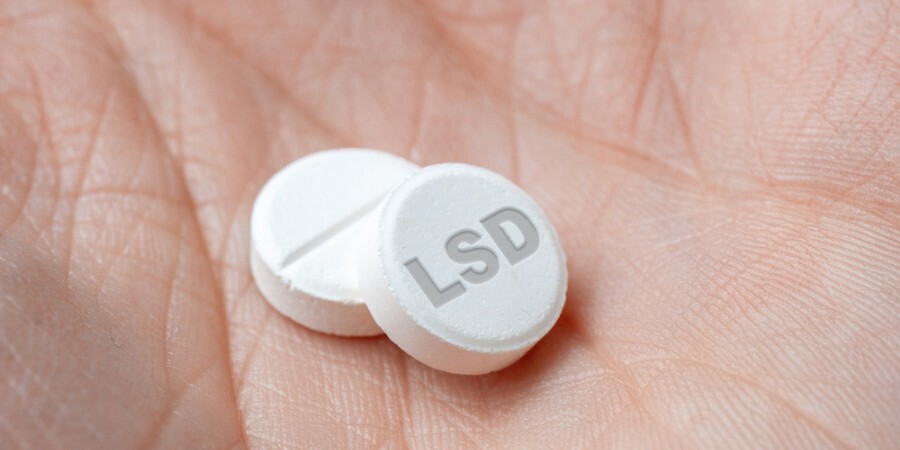
Written by:

Medically Reviewed by:
Last Updated:
February 14th, 2025
LSD addiction
What is LSD?
LSD, short for lysergic acid diethylamide, is a powerful hallucinogen known as ‘acid’. It originates from a fungus found on rye and certain other grains. When taken, it profoundly alters perception, mood and thoughts, creating what users call a ‘trip’ that can last up to 12 hours. These experiences can vary widely, with some feeling euphoric or gaining new perspectives while others encounter confusion or even paranoia.
In the UK, LSD is a Class A drug, making it illegal to possess, produce or distribute. This classification carries serious legal consequences, including potential prison time and heavy fines for those involved.
Is LSD addictive?
LSD isn’t considered physically addictive in the way some drugs are. People don’t typically experience physical withdrawal symptoms after stopping LSD, unlike with opioids or alcohol. However, LSD can still lead to a kind of psychological dependency. Since the drug creates intense, often surreal experiences that users can find highly appealing or even transformative, some individuals might find themselves repeatedly seeking out those experiences.
This psychological dependency often stems from the escapism or the sense of enlightenment that LSD may seem to provide. Over time, a person might rely on LSD to deal with reality or to escape challenging emotions, creating a habit that’s mentally hard to break.
Can frequent LSD usage be dangerous?
Long-term LSD usage poses significant dangers, largely due to its complex and enduring impact on brain chemistry and mental health. Here are key reasons why prolonged use can lead to serious health risks:
Tolerance and escalating dosages
LSD builds up in the body over time, leading to tolerance. To achieve the same effects, users often feel compelled to increase their dose, which heightens both the physical and psychological effects. Higher doses not only intensify the chance of a ‘bad trip’—a deeply distressing and sometimes traumatic experience—but also increase the risk of accidental overdose or lasting mental health effects.
Flashbacks and recurrence of drug effects
Flashbacks, or hallucinogen persisting perception disorder (HPPD), are a well-known side effect of LSD. Even months after stopping the drug, users may experience sudden and unprovoked recurrences of past LSD experiences. These flashbacks can be disturbing, leading to anxiety and confusion and may even result in traumatic episodes as they resurface unexpectedly.
Increased risk of severe mental health conditions
Chronic LSD use has been associated with severe, long-lasting mental health issues, including schizophrenia and significant depression. Although not every user will experience these outcomes, the risk is particularly concerning for individuals predisposed to mental health disorders. LSD’s impact on serotonin, the neurotransmitter linked with mood, emotion and perception, might trigger these conditions, especially with prolonged use.
Persistent alterations to perception and reality
Extended LSD usage can lead to a lasting shift in how a person perceives reality. While some may seek these experiences, over time, such alterations can blur the line between hallucinations and real-life perceptions, potentially making it difficult for users to distinguish between the two. This phenomenon can lead to confusion, paranoia or detachment, impacting relationships and a person’s ability to function in daily life.
What are the signs of LSD addiction?
Recognising the signs of LSD addiction is essential because, while LSD isn’t typically associated with physical dependency, it can lead to psychological and behavioural patterns that impact day-to-day life. Knowing these signs can help identify when casual or experimental use may have shifted into something more concerning, allowing for timely support and intervention.
This awareness is important for the person using LSD as well as their loved ones, as noticing small changes can prevent more serious consequences down the line.
Psychological signs
- Obsessive thoughts: This might look like constantly thinking about when the next opportunity to use LSD will be, even in situations where it isn’t practical or safe. For example, someone might spend a lot of time planning their next trip, even neglecting other responsibilities to do so.
- Mood swings: You may notice someone going from very upbeat and positive to irritable or withdrawn when they aren’t under the influence of LSD. These mood changes can be a response to the contrast between the effects of LSD and the reality of daily life.
- Loss of control: People may find it hard to reduce or stop their LSD use, even if they want to or recognise the negative effects. For example, they may promise themselves they’ll only use it occasionally but find that they’re using it more frequently than intended.
- Escapism: Using LSD as a way to escape from stressful situations or emotions can be another sign of dependency. Rather than addressing stress or life challenges, the individual might turn to LSD as a coping mechanism.
Behavioural signs:
- Increased risk-taking: Someone might start engaging in risky behaviours, like driving while under the influence or using LSD in unsafe settings. This can extend to risky decision-making, even when not using if the person is focused on obtaining or planning their use of LSD.
- Neglect of responsibilities: When LSD use starts to interfere with responsibilities like work, school or family duties, it’s a clear signal that use is taking precedence over important aspects of life. They might skip work frequently or avoid commitments to make time for their next trip.
- Social withdrawal: The person may begin to distance themselves from friends or family who don’t use LSD or don’t support their usage. They might choose to spend time only with others who are part of the drug-using circle.
- Tolerance development: Over time, the person may need to use higher doses of LSD to achieve the same effects, leading to a cycle of increased use and more intense experiences, which can be hard to break.
How can Liberty House help with LSD addiction?
At Liberty House, we understand that LSD addiction can profoundly impact various aspects of your life, often leaving you feeling overwhelmed. Our treatment approach is designed to help you regain stability and build a healthier future.
We start with a thorough assessment to understand your unique needs, followed by a detox programme that provides a supportive and safe environment for managing any psychological impacts the drug may have had on you.
After detox, our programme includes therapies like Cognitive Behavioural Therapy (CBT) and Dialectical Behavioural Therapy (DBT) to explore the underlying causes of addiction and help you develop positive coping strategies. You’ll also have access to one-on-one counselling, group therapy, and holistic options such as art and yoga, offering a well-rounded recovery approach.
Finally, our aftercare services are there to support you as you reintegrate into daily life, ensuring you have ongoing guidance and encouragement.
Liberty House provides a safe, compassionate environment where you can begin your journey to lasting recovery. If you’re ready to take that first step, reach out to us today to learn more about our LSD addiction programme.







